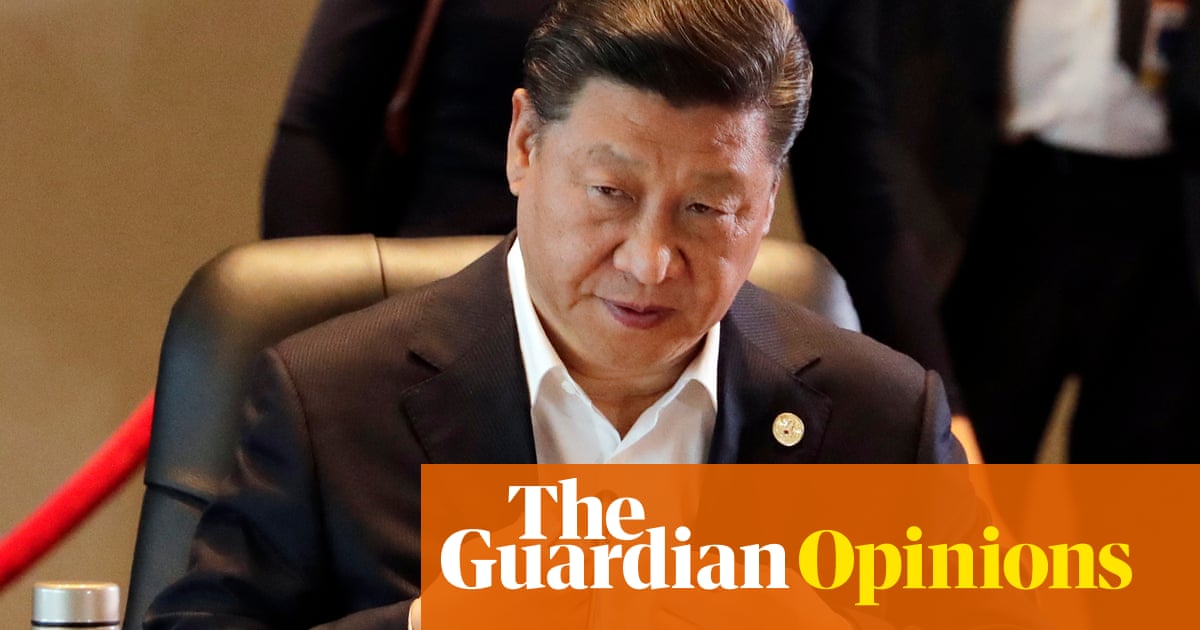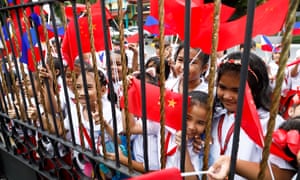The trial of leading Chinese pro-democracy activists that opened this week in Hong Kong, is the latest, dismaying example of how China’s president, Xi Jinping, appears hellbent on extirpating every last vestige, squawk and squeak of political pluralism and public dissent. Tales of repression in China are sadly nothing new. What is different, and underappreciated in the west, is the way Xi is inexorably and single-mindedly expanding draconian systems of social control centred on the Communist party and the de facto dictatorship of one man: himself.
China has never been noted for benign or enlightened leadership. Nothing has quite matched the excesses of the Mao Zedong era, although Deng Xiaoping came close in Tiananmen Square in 1989. More recent leaders, such as Jiang Zemin and Hu Jintao, concentrated on economic development. Hu championed China’s “peaceful rise” abroad through the use of soft-power diplomacy. But Xi, in overall charge since 2013, is something else again – ruthless, relentless and global in his ambition to project China’s power and influence.
The negative impacts of the Xi ascendancy are everywhere to be seen. When viewed as a whole, they form a disturbing composite picture of a country in the grip of an unaccountable modern-day mogul wielding limitless power. This week’s Hong Kong trial is a blatant assault on the right to free assembly and freedom of speech enshrined in the former colony’s Basic Law. The British government should be doing much more to uphold it. But in truth, Hong Kong is relatively fortunate. In practice, such rights simply do not exist elsewhere in Xi’s China.Xi’s autocratic Chinese model sets the standard for every jumped-up tuppenny despot keen to make a mark. But the difference between Xi and, say, Mohammed bin Salman, Recep Tayyip Erdoğan or Rodrigo Duterte, is that he’s totally organised, totally focused. Now known as “core leader”, he effectively became president for lifeearlier this year. He has consolidated personal control of the politburo, the military, the national security commission and the state bureaucracy, all of which he purged. Civil society groups, the media, the internet, and religious and academic institutions suffer tight restrictions. While ideological debate is discouraged, Xi’s ultra-nationalist “thoughts” have been incorporated into the constitution.
The gross mistreatment of Muslim-minority Uighurs in western Xinjiang province, where hundreds of thousands are held in “re-education camps”, recently gained international attention. But similar abuses aimed at erasing ethnic and cultural identity have long been rife in Chinese-occupied Tibet. Other parts of the country appear fated to succumb to the same cultural engineering and mass surveillance techniques. Yet Xi makes no apologies. Where once China’s leaders would have worried about international disapproval, he exhibits a sense of impunity borne of knowledge that weak, self-interested western governments are loth to interfere.
Xi’s China is pushing ahead with a “social credit system” to reward or punish individuals and businesses by rating them using technology that aggregates personal, family and workplace behaviour records. Beijing’s municipal government said this week it plans to award “personal trustworthiness points” – in effect, measuring a person’s worth on a state-run integrity scale. Pity those unfortunates who fail to persuade “Big Daddy” Xi of their future usefulness.
In the past few days alone, China has jailed the author of a gay erotic novel, despite having supposedly decriminalised homosexuality; blacked out TV coverage of a film awards ceremony because one of the winners called for Taiwan’s independence; and continued to hold Meng Hongwei, the first Chinese head of Interpol, without explanation or charge, having first abducted him in September. According to Amnesty International, a similar fate has befallen hundreds of Chinese human rights lawyers, activists, writers and others who ran foul of Xi’s regime of fear. Human Rights Watch talks of a “broad and sustained offensive” against human rights under Xi that shows no sign of abating.
Xi’s repressive vision of one-party conformity, stability and order at home is matched by an ultra-nationalist, aggressively expansionist worldview that, unlike his predecessor Hu’s, seeks superpower status for China by all available means. His $1 trillion, 64-country One Belt, One Road Eurasian trade, infrastructure and development initiative symbolises China’s economic, financial and developmental outreach, which now extends throughout the Indo-Pacific region, Africa and Latin America.
But Xi’s China is also engaged, simultaneously, in a rapid buildup of its armed forces and missile, space, AI and cyber capabilities; in the assertion of physical control in the South China and East China seas; in relentless efforts to ostracise and isolate Taiwan; and in a growing struggle over territory, trade and influence with the US, illustrated by last weekend’s bad-tempered Asia-Pacific Economic Cooperation (Apec) summit in Papua New Guinea.
Over the years, western governments have tended to the view that, as China grew more prosperous, its government’s behaviour would more closely resemble their own – even that it would eventually embrace democracy. Xi’s unchecked ascendancy suggests the opposite. In a recent speech, Kevin Rudd, the former Australian prime minister, sounded a clear warning: “China does not accept the values that underpin the current liberal international order. They are not compatible with China’s domestic political order.” So, rather than change China, Rudd said, Xi had decided instead to change the world.
Xi’s autocratic power paradigm points not only to increasing systemic repression at home and growing economic dominance abroad. He also seeks to export his quasi-Stalinist ideas about politics, governance and social control to a phalanx of developing, more or less dependent countries – what Europeans, in old money, might call an empire. The challenge of a rising China is about far more than money and power. It is about the survival of democratic values in a 21st-century world where the old democracies increasingly fail to fight for them.
• Simon Tisdall is a foreign affairs commentator. He has been a foreign leader writer, foreign editor and US editor for the Guardian
We have some news …
… three years ago, we knew we had to try to make The Guardian sustainable by deepening our relationship with our readers. The revenues from our newspaper had diminished and the technologies that connected us with a global audience had moved advertising money away from news organisations. We knew we needed to find a way to keep our journalism open and accessible to everyone, regardless of where they live or what they can afford.
And so, we have an update for you on some good news. Thanks to all the readers who have supported our independent, investigative journalism through contributions, membership or subscriptions, we are starting to overcome the urgent financial situation we were faced with. Today we have been supported by more than a million readers around the world. Our future is starting to look brighter. But we have to maintain and build on that level of support for every year to come, which means we still need to ask for your help.
Ongoing financial support from our readers means we can continue pursuing difficult stories in the challenging times we are living through, when factual reporting has never been more critical. The Guardian is editorially independent – our journalism is free from commercial bias and not influenced by billionaire owners, politicians or shareholders. This is important because it enables us to challenge the powerful and hold them to account. With your support, we can continue bringing The Guardian’s independent journalism to the world.


No comments:
Post a Comment
Comments always welcome!